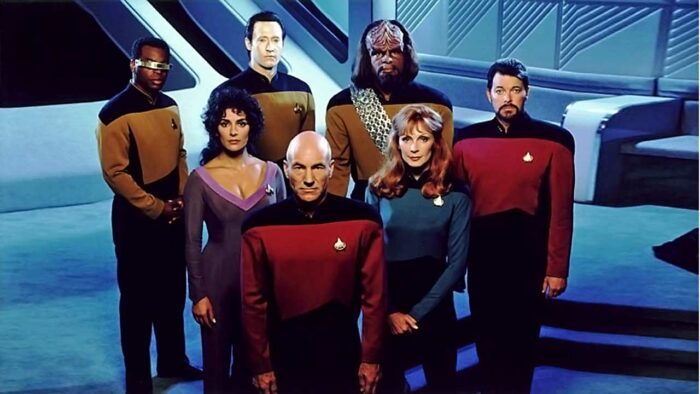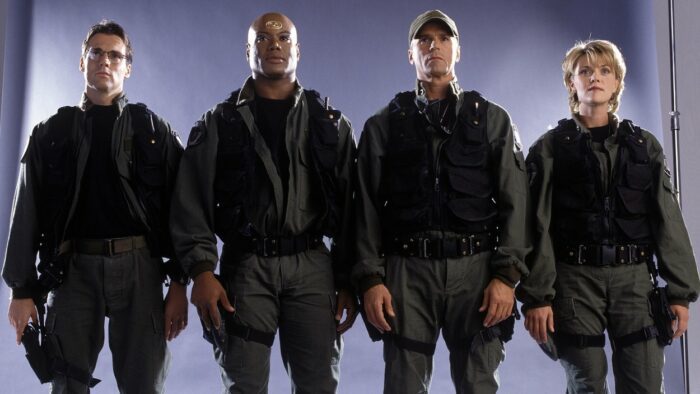We, devout lovers of the almighty genre of science fiction, waited in hope for the next great text to rise up and entertain us. Finally, our faith was rewarded. For given unto us, courtesy of James S. A. Corey, was a science fiction series of which we’d never seen the likes of before: The Expanse. This gave us cause for celebration; we rejoiced and gave thanks. Then, like so many other promising sci-fi series before, it was taken from us too quickly. But this time it was different. We congregated, rose up, made our voices heard, and finally, our prayers were answered. The wise men and women of Amazon Prime chose to resurrect the latest of our great texts, restoring it to its rightful place at the head of the sci-fi genre on December 13, 2019. For this we rejoice and give thanks once more.
In all seriousness thought, the science fiction genre always tends to have quite a continuous stream of content making its way to us. So much so that it’s sometimes hard to filter through—to weed out the good from the bad. Often times, it feels like we must enjoy them otherwise they might all disappear from our streaming networks. We’ve seen it happen before. We learnt to appreciate the mediocre because it’s a better alternative than nothing at all. But to me, and maybe to you, these series only barely fill the deep void in my pounding sci-fi heart. It’s like craving a decent brunch, but only getting served sliced bread and jam. Sure you’ll eat it, but you know it’s just a nibble of what it could be. You need eggs and avocado and toasted sourdough—possibly halloumi. We know this, because we’ve eaten brunch before, and we know how good it can be. Bread and jam just ain’t brunch, and spin-offs just ain’t original sci-fi.
Until recently, there had been two great pillars propping up the world of science fiction series. The first was Star Trek: The Next Generation (TNG). (Now I appreciate TOS was there first, but it felt more plucky-hero-saves-the-day-space-opera that, while immediately creating many sci-fi tropes, didn’t do as much to expand on the sci-fi genre as a whole. Also, I like it less and I’m writing.) The second was Stargate SG-1, a series based of the 1994 film Stargate. These shows were a revolution in science fiction with subgenres so elemental it’s hard to imagine they hadn’t been done before. They’d set the benchmark for what fans expected from the genre. Inevitably, they went away, and we were left in darkness. Sure, perhaps one or two promising stars sparkled briefly before being snuffed out. But, ultimately, we were just left to endure spin-offs and remakes while we let the rise of comic book cinema and series try to fill that void in our hearts.

During this dark age, however, something special was happening: two writers, Daniel Abraham and Ty Franck were creating something original—imagining a new universe. New heroes were forming. A new story was being told and shared. Then, on December 14, 2015, a miracle happened. This original, detailed, and vast, science fiction story aired as a series on the Syfy network, bring the hopes and dreams of many fans to life. The Expanse was the brunch of the decade, it was the smashed avocado on sourdough with a frothy cappuccino and a cold-pressed fruit juice. It was everything every sci-fi lover had forgotten they’d been waiting for.
After almost four decades, the holy trinity of science fiction was complete. Another original story that we’d be able to watch and re-watch again and again for decades to come. But what is it that sets these three shows above the swarm of other science fiction television that comes and goes? What are the genre defining elements that’ll keep us talking about these three shows in particular for another 30 years? For me, it comes down to the execution of three core foundations: premise, plausibility of technology, and sustainability.
Here, premise refers to the general elements that make up any fiction, such as setting, characters, point of view, theme, and tone. The premise is the first thing to get right for a new sci-fi series. Not every one of these elements has to be new for every new story that is told. But, swapping out at least a couple of these elements goes part of the way to creating something original. If not enough elements are swapped around, we—us devourers of content—easily see the overlap of our other favorites showing through. The Orville is a perfect example of when you swap out the basic element of ‘tone’ from that of TNG. We can refer to this as a perfect example because it was intentionally done. In other cases, the swap out of premise elements is far more subtle. But, live long enough and you begin to see the same things repeated over and over. What sets apart the holy trinity of science fiction series is that they refresh more than one of these premise elements, which results in something almost completely unique.
TNG is a glimpse of a society far into the future. We follow a civilization, formed around shared morals, that is doing its darnedest to stick to them even when they conflict with human nature. Upholding these morals requires the discipline and professionalism which form the underlying tone of the show. It takes itself seriously, adding gravitas to the ideals it presents, and lending plausibility to the universe. Accompanying the future setting and serious tone are idealistic characters. In TNG our heroes are frequently at the top of the space food chain, both in technology but also society, as we perceive it from today, but we learn how much further there is to go beyond that. We are just along for the ride (our point of view). Rarely do we need to root for The Enterprise crew. Rather, we are merely there to learn along with them on their journey of exploration. Sure, there is war, politics, et cetera, but they are all just deviations from that one central theme: exploration, which is the central motivation for the show and underpins a lot of the action.
Exploration is the one premise element shared between TNG and SG-1. That said, exploration as a theme is used by surprisingly few sci-fi stories (most are survival), and this keeps the shows relatively fresh even today, as resolution rests on discovery and not just winning or losing. Exploration is what takes the SG teams through the gate every day. However, in contrast to TNG, SG-1 is set in today’s day and age and humanity is plagued with all the familiar shortfalls and quirks that we recognize in our own life. The characters here, too, contrast those of TNG. The heroes in SG-1 are very much the underdogs in the newly opened up universe they have the privilege to explore. They have no more worldly wisdom than you or I may have. Every challenge is new and almost always way over the team’s head, and we are part of that team. We often see what they don’t, leaving us to squirm as they stumble from danger to danger. We feel they need our support, like we could help if we were only there. This exploration from a contemporary, twenty-first century setting, is no darker or lighter than TNG. It is, however, less serious, not afraid to poke fun at itself (thank you Richard Dean Anderson).

Unlike SG-1 and TNG, the tone of The Expanse is far darker, and this darkness stems from the ‘survival’ theme that kicks off the show. Whether it’s the human race surviving a system-wide war, or our heroes surviving through the day, self-preservation is the big motivator. Surviving against adversity places the characters neatly into the underdog category here too. The good and bad tend to be divided up between those who hold all the cards, and those trying to uncover them. And our heroes are definitely trying to uncover them. Perhaps the most compelling element of The Expanse’s premise is the setting. The stage of this whole story isn’t today as with SG-1, nor is it the distant future like it is with TNG, it is the not-too-distant future. A future that feels plausibly obtainable to us living right now. One where human society is split over the system, and where the economic powers of the solar system are shifting. This plausible future leads us to the second foundation of good science fiction: the plausibility.
When it comes to plausibility, what sets the The Expanse apart from TNG and SG-1 in how it uses physics. The way the show is bound by our conventional understanding of physics creates a realism that is otherwise unseen in sci-fi television. Suddenly, speed requires acceleration and slowing down requires equal and opposite force; distances take time, changing directions mean g-forces, and the only artificial gravity is what is generated by thrust or spin—no gravity plating here. This level of realism is new in sci-fi series and it creates dramas of its own.
In contrast, technology in TNG is completely fictional almost from the ground up, but with two caveats that keep it plausible: it is set many centuries into the future, beyond our current understanding of physics, which on its own isn’t unique. What is unique—or was—is the lengths the show goes to in explaining how the technology works. There’s made up elements, particles, metals, drives, fields, even physics itself, but it is a sort of explanation, and lends itself to the believability of the universe.
Like The Expanse and TNG, SG-1’s unique utilization of technology also lends to its plausibility. At least in the first six seasons, all the unfamiliar technology was explicitly alien. Everything from the little Zat guns to the stargate itself were collected. Part of the adventure across all the Stargate shows is understanding and utilizing this new tech—that’s the mandate of the Stargate Program after all. Of course, like TNG, the technology is unrealistic and beyond physics as we understand it, but also like TNG, it isn’t taken for granted. There’s always an explanation provided of how it may work, even if the components that make it work are fictional. This continues throughout the show until the humans are a technological superiority in the galaxy. But serving as backdrop or plot devise to create drama is only half the function of technology in a sci-fi series. The second half is what separates good sci-fi from just a good show, and that is, dramatic science fiction content.

So far, we’ve seen how original sci-fi premises and the plausibility of sci-fi concepts has led to TNG, SG-1, and The Expanse becoming the holy trinity of science fiction series—our go to, our fall back, our love, for the next few decades—but there is one more foundation which helps elevate these shows to their divine status: sustainability.
With their broad theme of exploration, TNG and SG-1 could have technically continued indefinitely. Whether by warp speed or stargate, the galaxy is a big place, and there are always many new adventures to be had. Obviously, in our real-world, other factors determine the longevity of a show, but in the fictional universe they have no limits. For shows with a survival theme, sustainability can be harder to reach. We can’t watch a cat and mouse story indefinitely. Either the heroes have to die, or they have to survive and destroy their adversaries, become superior, escape the danger, find their sanctuary. It’s at this point—if it reaches this point—that a survival sci-fi series can either end its run (think Battlestar Galactica) or evolve. And with the coming of Season 4 of The Expanse, the evolution is underway.
The Expanse was very much survival themed at its core, but at the end of Season 3 that all changed. A thousand gates opened up to a thousand seemingly habitable solar systems. A new age of exploration was beginning, and with it there are many more questions that need answering about the builders of the protomolecule and the gate system. Suddenly, the sustainability went from finite to infinite. Our heroes had survived, and now the next great adventure was beginning.
I won’t lie, I’ve read ahead in the novels, and I’m pleased to report that the premise hasn’t completed diverged from its survival theme. Surviving through the day is still prevalent, but the setting is no longer restricted. There are seasons worth of different potential mysteries to be explored and unfold for as long as Amazon continues to bring it to life. Now that The Expanse has adapted itself into a show that can seemingly continue forever, it’s taken up its place in the holy trinity of science fiction television shows. It’s almost guaranteed that, like TNG and SG-1, whatever happens after its run is over, we’ll still be left wanting more because there is so much left to explore within that universe.
These three shows, Star Trek: The Next Generation, Stargate SG-1, and The Expanse, have what so many other science fiction shows don’t: original premises, plausibly technological and sci-fi drama, and adventures that we’ll be able to enjoy for years to come. For me, the holy trinity of science fiction series is now complete, a shrine erected, and I pass my respects daily. We’d been missing the next great science fiction series for years, but we hadn’t known what exactly we’d been missing. When The Expanse did finally arrive, we immediately recognized it for what it was: a timeless classic. Unlike so many shows before it, it didn’t just fill the hole we collectively shared, it expanded our hearts and minds (pun intended). For that, I’m so excited to watch Season 4 when it’s released December 13. What three science fiction series make up your holy trinity? Is there another show out there that deserves a place above the altar? Let me know.


Swap out SG-1 for Battlestar Galactica(2003) or Babylon 5.